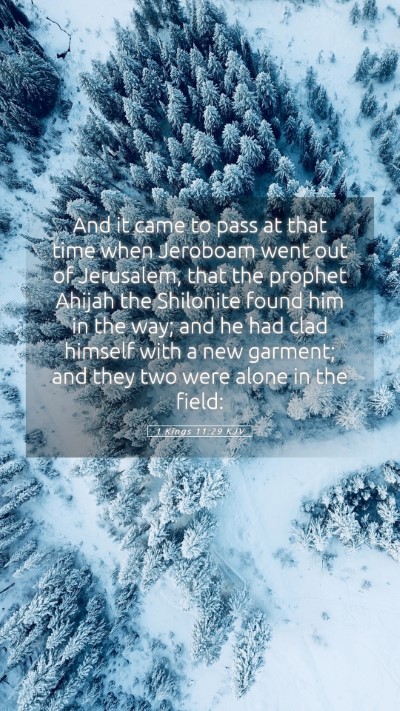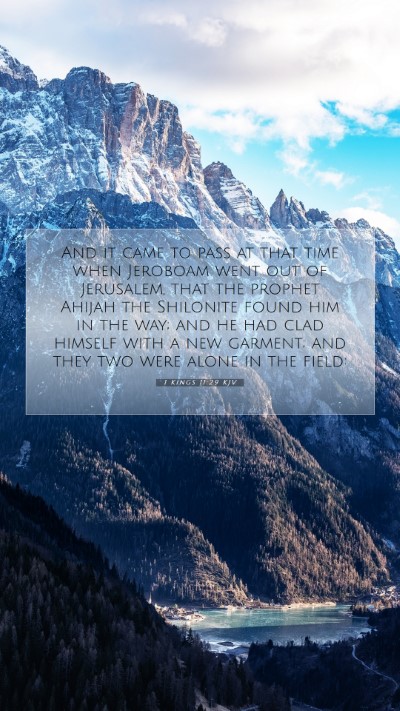Understanding 1 Kings 11:29
In order to grasp the meaning of Bible verses, particularly 1 Kings 11:29, it is essential to delve into the historical context and the narrative surrounding this passage. This verse depicts a significant moment in the reign of King Solomon, specifically focusing on the figure of Ahijah the Shilonite and his prophetic message regarding the division of the kingdom of Israel.
Verse Context and Analysis
1 Kings 11:29: "And it came to pass at that time, when Jeroboam went out of Jerusalem, that the prophet Ahijah the Shilonite found him in the way; and he had clad himself with a new garment; and they two were alone in the field."
This verse emphasizes the personal encounter between Jeroboam and Ahijah, marking the beginning of a pivotal change in Israel’s history.
Verse Commentary Insights
Matthew Henry's Commentary
Henry highlights the significance of this encounter, noting how Ahijah’s prophetic ministry as a representative of God serves as a foreshadowing of the division of the kingdom. He emphasizes that the meeting takes place in solitude, indicating the seriousness of the message being conveyed. Henry points out that Jeroboam, who has been in Jerusalem, is now depicted as a man on the cusp of great change, a transition from servitude to leadership.
Albert Barnes' Commentary
Barnes stresses the role of Ahijah as a prophetic figure bringing forth a message of divine judgment and transition. The new garment symbolizes a fresh start for Jeroboam, contrasting his past as a servant with the new responsibilities that lie ahead. According to Barnes, this signifies God's initiative in appointing new leadership for Israel, reflecting divine sovereignty over national affairs.
Adam Clarke's Commentary
Clarke delves into the implications of Ahijah’s prophecy, noting the symbolic nature of the torn garment used as a metaphor for the division of the kingdom. He elaborates that this moment marks not only a physical separation but a spiritual one, as the people of Israel would soon face challenges that stemmed from disobedience and idolatry.
Key Themes and Considerations
- Prophecy and Fulfillment: The encounter signifies how God uses prophets to communicate His will. This divine communication is essential for understanding scripture.
- Leadership and Responsibility: Jeroboam’s rise to prominence illustrates the themes of leadership, responsibility, and the heavy burden of governance.
- Divine Sovereignty: The passage reflects the overarching theme of God’s control over Israel’s fate, emphasizing that even in moments of human decision-making, God's plans prevail.
Bible Study Applications
For those engaging in Bible study groups or seeking Bible study lessons, the analysis of this verse can encourage discussion on the implications of prophetic messages in our lives today. Consider the following:
- How can we discern God's voice in our life decisions?
- What does it mean to accept leadership roles in faith communities?
- In what ways might we be called to bring about change in our communities?
Cross References
- 1 Kings 11:31: Ahijah's prophecy further elaborates on the division of the kingdom.
- 2 Chronicles 10: The account of Jeroboam's rise and the kingdom's division.
- 1 Kings 12:19: The consequences of Jeroboam's reign and the fulfillment of prophecy.
Conclusion
In Bible verse interpretations, understanding passages like 1 Kings 11:29 is crucial for grasping the narratives that shape biblical history. This verse serves not only as a historical account but as a reminder of God's involvement in human affairs and the importance of listening to His guidance.


